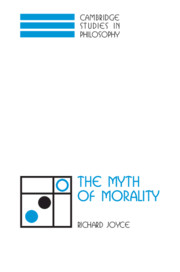Epilogue: Debunking myths
Published online by Cambridge University Press: 22 September 2009
Summary
Myths are narratives; they tell of the exploits of heroes, of supernatural events, of other worlds, of primordial love affairs and of symbolic deaths. When I talk of morality as a myth I do not intend to use the word literally, since morality, as we now conceive of it, lacks any such literary structure. But nor do I intend to use the word in its familiar quasi-metaphorical mode, to mean simply a widely held belief that is false (“the myth of the noble savage”). Perhaps, then, “myth” is an ill-chosen term, but it is employed because I believe there is room for a fruitful connection to be made between the fictionalist attitude towards a false theory and a culture's attitude towards its myths.
A naive view of myths takes them to be inadequate hypotheses, attempting to explain natural phenomena. According to such a view, a culture would not distinguish its myths from any of its other descriptions of the world, and, indeed, would not recognize them as “myths” at all. Such a view has long been discredited. Bronislaw Malinowski, in his groundbreaking field studies of the Trobriand Islanders early in the twentieth century, found the natives using three classes of narrative. The first consists of grotesque, bawdy tales, often involving supernatural events, which are told entirely for entertainment and are not believed for a moment. These he called “folk tales.” The second class may be called “historical legends,” relating deeds of past chiefs, heroes, battles and shipwrecks.
- Type
- Chapter
- Information
- The Myth of Morality , pp. 232 - 242Publisher: Cambridge University PressPrint publication year: 2001



